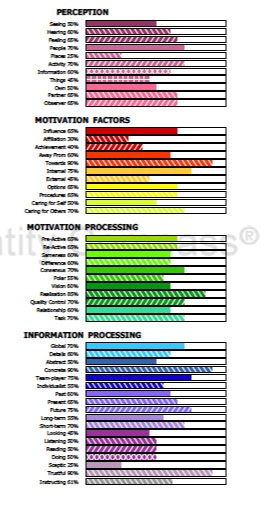Elevating Your Coaching Journey: The Power of the Identity Compass Test
Over the past two years, I've dedicated myself to understanding a valuable tool known as the Identity Compass ® developed by Arne Maus. My goal is to seamlessly integrate it into our coaching sessions, enhancing both our personal growth and my coaching skills. In this article, we'll explore the practical benefits of the Identity Compass® test, addressing essential questions about its nature, its relevance to you, and how it can enhance your coaching journey.
Understanding the Identity Compass®
The Identity Compass® is a scientifically validated tool designed to uncover insights into how individuals construct their thinking patterns, which in turn influence their behavior. This psychometric instrument dives deep into your self-identity and communication preferences, providing a comprehensive understanding of your unique traits and tendencies.
At its core, the Identity Compass® test measures what we refer to as "Cognitive Intentions" or "Meta Programs."
Decoding Cognitive Intentions
Cognitive Intentions, in essence, are cognitive biases that shape our perception of reality. These biases are part of our conditioning and affect the way we think, process information, and engage with different aspects of life. The Identity Compass® test methodically assesses these cognitive intentions, categorizing them into four primary orientations, each representing a distinct approach to perceiving and interacting with the world:
Perception
Motivation Factors
Motivation Processing
Information Processing
The Relevance for You as a Coachee
The Identity Compass® offers a unique perspective on your personality and cognitive patterns. Any challenges or difficulties you face may stem from choices that once served as coping mechanisms but have evolved into cognitive intentions that now influence your biases, often without your awareness. This test is invaluable for your personal and professional development as it provides the objectivity needed to recognize and transcend your patterns and biases.
In essence, the test allows you to gain an objective view of your inner world, a lens through which you can perceive your own subjective filters. Objectivity leads to awareness, freeing you from the limitations of your personal biases.
Not only that. Dr. Darren Stevens used the Identity Compass® and Cognitive Intentions and linked them directly to your vertical development. What his means is that this test uses your Cognitive Intentiosn to reveal your stage of maturity, following Stevens' Stages of Awareness, and your stage of thinking, as per Keagan's Stages of Cognitive Development.
Your growth as a person involves becoming objective about your subjectivity, allowing you to perceive and act with the clarity necessary to fulfill your potential.
A Game-Changer in Coaching
The Identity Compass® test stands out as a game-changer in coaching because it provides a holistic understanding of self-identity and communication preferences. Unlike traditional coaching tools that merely scratch the surface, it delves deep into your personal development. By leveraging this comprehensive perspective, you can uncover your patterns, developmental stage, and the driving forces behind your cognitive intentions. Armed with this knowledge, you can integrate it into our coaching conversations, gaining insights into how these dynamics play out across various aspects of your life.
This test presents an opportunity to move closer to your potential, embrace your possibilities, and free yourself from early learned fixations. It's about disintegrating established patterns to create a more resourceful and authentic version of yourself.
By taking the Identity Compass test®, you will:
a) Gain Clarity of Your Biases and Patterns: Develop a profound understanding of your communication preferences, motivations, and worldviews. You will become objective to your subjectivity.
b) Find Direction: Explore the Cognitive Intentions you weren’t aware of to enquiry into them and decide where to focus your intentions for personal growth.
c) Improve Relationships: Enhance your communication skills, strengthening authentic connections in your personal and professional life.
d) Foster Integral Growth: Embrace a holistic approach to personal development, nurturing a more balanced and integrated version of yourself.
Sneak Peak of the test
You will get a PreScan, brief description of every Cognitive Intention, and overview of your preferences, a comparison of your Cognitive Intentions vs the average population that has taken the test, your thinking quotient, awareness quotient, level of autonomy/dependency and engagement, among other meassures.
(The images provided may appear blurry intentionally as the test content is private and confidential. However, they serve as a reference point for individuals to get a visual sense of what they will receive.)
Key Considerations When Taking the Test
The Identity Compass test is grounded in a work context, with each question related to how you process reality in your professional life. While this focus may seem narrow, it serves as a practical anchor. However, your dominant cognitive intentions may extend beyond this context, influencing various aspects of your life. Any exceptions to this rule will be discussed during our coaching conversations.
From my perspective, the test interface appears to be reminiscent of an older era, perhaps from the 1800s (lol). I want to ensure you are aware of this aspect, so there are no surprises.
Furthermore, it's crucial to respond to the test honestly, reflecting your actual behaviors rather than idealized ones. Remember, your Identity Compass® result doesn't define who you are but uncovers how you filter reality, often without conscious awareness. Awareness grants you the opportunity to shift these cognitive intentions, ultimately evolving your developmental stage and awakening to your potential, possibilities, and autonomy.
In conclusion, the Identity Compass® test offers a practical path for personal and professional development. As we embark on this journey together, my hope is that it empowers you to cultivate self-awareness, enrich your relationships, and unlock your full potential as we navigate the path of personal growth and self-discovery.
If you have any doubt please write us an email.



